- Home
- Simon Mayo
Itch
Itch Read online
Contents
Cover
About the Book
Title Page
Dedication
Introduction
Chapter 1
Chapter 2
Chapter 3
Chapter 4
Chapter 5
Chapter 6
Chapter 7
Chapter 8
Chapter 9
Chapter 10
Chapter 11
Chapter 12
Chapter 13
Chapter 14
Chapter 15
Chapter 16
Chapter 17
Chapter 18
Chapter 19
Chapter 20
Chapter 21
Chapter 22
Chapter 23
Chapter 24
Chapter 25
Chapter 26
Chapter 27
Chapter 28
Chapter 29
Chapter 30
Epilogue
The story continues …
Author’s Note
Acknowledgements
About the Author
Copyright
About the Book
Itchingham Lofte had caused explosions before.
There had, in truth, been many bangs, flashes and smells coming from his bedroom in the past. But there had been nothing like this one. It wasn’t just the bedroom walls that shook; it was the whole house.
Not that Itch was aware of any of that, as he was unconscious.
He would have stayed that was too if it hadn’t been for the fact that his eyebrows were on fire …
To my son Joe,
where it all
started.
Cornwall, England
December
The earthquake was a small one. The post office shook only slightly, the window rattling in its frame and dislodging an Advent calendar. The van outside vibrated just enough to set off its alarm, and if you were watching closely you might have seen the traffic lights shudder in their concrete base.
A local nurse out walking her dog felt a vibration through the pavement and stopped. She would have thought nothing of it but for her Labrador’s sudden bark and raised hackles. She could hear at least two other dogs reacting with a torrent of howls and yelps in houses nearby. The nurse looked around, then shrugged and resumed her walk. Her dog followed, tail between his legs.
A man reading his paper in the bath felt a rumbling and, glancing down, noticed a tiny series of waves running from the edge of the bath to his knees. There were three sets of waves in all, each one a centimetre behind the other. He got out of the bath, telling himself it was because the water had gone cool.
Beneath the man’s house, the foundations absorbed most of the tremor. One metre below his basement, the peat that lay beneath moved and folded, and the silt that was ten metres deeper still cracked and heaved for the first time in decades.
Under this was ten metres of sand and all sorts of crushed shells laid down over millions of years – all moving, creasing and pushing into new shapes and layers. Below that lay twenty metres of slate and tin which had shaped so much of the county’s history. Then came the granite; under pressure from the magma – the liquid rock heated by the Earth’s core – its veins and cracks opened and closed.
And from deeper still came a small dark cluster, pushed up higher and higher, forced through the fissures, stopping only when it met the cooler, solidified mass of granite that ran for miles like a ceiling, north, south, east and west.
It stopped there.
One thousand metres beneath the man and his bath.
Waiting.
1
ITCHINGHAM LOFTE HAD CAUSED explosions before. There had, in truth, been many bangs, flashes and smells coming from his bedroom in the past. His multi-stained carpet and pockmarked walls bore testament to that. But there had been nothing like this one. It wasn’t just the bedroom walls that shook; it was the whole house. Windows and doors rattled, the pots and pans in the kitchen jumped, and two drawers in the dresser opened.
Not that Itchingham was aware of any of that, as he was unconscious. He would have stayed that way too if it hadn’t been for the fact that his eyebrows were on fire – and the astute decision of his eleven-year-old sister Chloe to throw a mug of water over his face.
Itch (everyone called him Itch, apart from his mother, whose idea it had been to christen him Itchingham in the first place) sat up sharply, shaking the water out of his eyes. ‘What did you do that for, Chloe?’ he said. ‘I did have it under control, you know.’
Chloe shrugged. ‘Yeah, right. Your eyebrows were burning,’ and she turned and went back to her bedroom, which was across the landing.
Itch felt for the prickly remains of what used to be his eyebrows – what was left crumbled in his fingers. Then the unmistakable smell of burned hair filled his nostrils and he realized Chloe had been right. He stood up a little gingerly and thought he’d better go after her and admit it, but when he poked his head into her room he found she was already asleep. Itch marvelled at her ability to get back to sleep in seconds – something he had never been able to do. The truth is, if you sleep in the room next to a fourteen-year-old science-mad boy who likes to blow things up, you learn very quickly only to take any notice of the very big bangs.
Itch went into the bathroom to dry and inspect his face. Both eyebrows had indeed gone, and about an inch of his fringe too. His wavy blond hair tended to be straggly anyway, but this explosion had forced it into a shape that Itch couldn’t remember seeing before. Most of the sooty black smudge on the left side of his face came away with a vigorous rub.
Itch went back to his room and surveyed the mess. A really bad one this time. White smoke hung in the air and clung to the walls. Where the contents of his beaker had splashed, the carpet had turned black; Itch thought it had originally been green, but that was a long time ago. The beaker itself had shattered into a number of pieces, three of which had embedded themselves in the curtains, where they continued to smoulder. Burn marks surrounded each of the fragments. He climbed onto his bed to retrieve them and stood on a fourth piece, which crunched and then poked its way through his sock. Itch winced and pulled it free. Blood began to ooze through the cotton.
There had been a few posters on the walls, all bearing the scars of previous mishaps. All had now been blasted to pieces. He put their remains under his bed, together with the fragments of beaker. He scraped the chemical remains of the explosion off the carpet and wrapped them in his wet towel. These too were shoved under the bed.
Itch changed into his pyjamas and took his clothes, along with his bloodied sock, downstairs to wash. This, he had learned, was the only way to get rid of the smell of smoke. His foot still hurt from the shard of exploded plastic and he hobbled along to get the detergent. He put the washing machine on its quickest cycle and hoped it would all be done before his mother got back. Thirty-one minutes later the machine beeped at him and he hung his clothes up to dry.
With any luck, thought Itch, Mum won’t notice and I’ll just about get away with it. He had got away with so much over the years that this wasn’t necessarily wishful thinking.
But Itchingham Lofte had forgotten about his missing eyebrows.
Jude Lofte arrived home just after eleven-thirty. Though she often had to work weekends, this was late, even for her. Itch had been in bed for twenty minutes but was nowhere near sleep. It always took his brain a couple of hours to shut down anyway, but tonight he was lying in his dark room, increasingly aware of how much it stank. Even with the window open, as it had been for the two hours since the explosion, there really was no escaping the smell of burning phosphorus. He was annoyed with himself for many reasons; mostly because he’d used too much of the phosphorus he’d collected from a couple of ol
d ship’s flares. Too many match heads as well. And maybe, on balance, mixing them up with a screwdriver had been one of his more stupid ideas. He was also irritated that he had woken Chloe and she had seen the post-explosion chaos in his room.
Itch had a pretty good relationship with his sister, even though she was only eleven and – clearly – a girl. He knew that most fourteen-year-old boys ignored their younger sisters at best and dismissed them as deeply stupid at worst. But Itch and Chloe Lofte tended to stick together. They got called Itchy and Scratchy after The Simpsons, of course, but as Itch had explained to her on one of their walks back from school, there are plenty of worse things to get called. Chloe had pointed out that it was OK for him as he had such a ridiculous name anyway.
Itch heard his mother shut and bolt the door and go into the kitchen. She wouldn’t inspect anything too closely. Normally she made herself a tea and then worked downstairs in her study until very late. Sometimes so late that even Itch was asleep …
He heard the kettle being filled and the clatter of the tea tin being opened. Then a silence, followed by his mother’s footsteps in the hall, where she stopped.
Itch tensed. He could hear sniffing. His mother was now coming up the stairs, still sniffing. The smell of the burning phosphorus in his room had been so strong he hadn’t noticed that the whole house was filled with the stench.
Jude Lofte paused outside Itch’s room. She waited all of two seconds before opening his door. Slowly at first; then, as the still-powerful smell hit her nostrils, she opened it fully. The landing light shone into the darkness of the bedroom. Itch was lying on his side with his back to his mother, curled up in the classic foetal position. Quite why he was bothering to go through this pretence he wasn’t sure. He knew exactly what was going to happen next. He knew exactly what his mother was going to say.
‘Hello, Itchingham. Been busy?’ She sat down on the side of his bed. This was, he knew, the calm before the storm. She always started gently but it usually didn’t last long.
‘Oh, hello, Mum. Er, yes, I’ve done my French homework – though I did get—’
‘I wasn’t thinking of your homework. I was thinking of the smell of bonfires, which as we’re nowhere near the fifth of November almost certainly means you’ve had another accident.’
His mother got up and turned on the light. Itch had made a reasonable job of clearing up, but he hadn’t calculated on a late-night maternal visit. Fixing Itch with a stare, Jude crouched down beside his bed and peered underneath.
I really need to think of somewhere else to hide stuff, thought Itch as she pulled out the damp remains of the evening’s experiment-gone-wrong.
‘You really do need to think of somewhere else to hide stuff, Itchingham,’ his mum said, as though reading his mind. ‘Did you honestly think I wouldn’t look here? Did you think I wouldn’t know where to find the source of the stench – the latest you have blessed us with?’
The sarcasm was the final stage before eruption. In geography Itch had just learned about volcanoes and the Volcanic Explosivity Index, which was used to measure the power of eruptions. Mr Watkins had said that it went from ‘gentle’ to ‘severe’ to ‘colossal’ and finally ‘mega-colossal’. From his mother he could expect ‘colossal’ – though he wouldn’t rule out a full-blown ‘mega-colossal’.
Jude Lofte’s top lip quivered; Itch’s stomach tightened.
‘How many times, Itchingham? HOW MANY TIMES? I told you the last time when you set fire to your bed that any more – ANY MORE – accidents, and that was it. We only escaped then because Chloe had started keeping a fire bucket in her room.’
‘That was the classic volcano experiment!’ said Itch. ‘I just hadn’t realized how close the duvet was to the flames—’
‘Enough! Stop! No more experiments. At all. NONE.’
Itch said nothing, and now his mother slowed down. ‘Have I made myself clear? I want all your kit – chemicals, powders, potions, flasks, and whatever else you have hidden away in your wardrobe – outside in the garden after school tomorrow. No explosions, no “volcanoes”, no burning hydrogen bubbles. Nothing.’
Itch’s jaw dropped. ‘But I can’t just leave everything in the garden. It isn’t safe!’ He felt a bit panicky now. His ‘kit’, as his mother called it, had taken a long time to assemble and was his pride and joy. His friends at school talked mainly of football and surfing; he had no interest in the first and only a passing one in the second. His passion – his ‘really lame hobby’, as Chloe called it – was about to be cleared out of his room for ever.
‘Well, you should have thought of that before you tried to blow up the house. And what have you done to your face?!’ Jude had stopped looking around her son’s bedroom and had just noticed his eyebrows. Or lack of them.
‘Oh, they burned off. Sorry.’
‘SORRY?’ shouted Jude. ‘Sorry? You could have been blinded! Really, Itchingham, you are an idiot sometimes.’ She put her hand under his chin and tilted his head up to the light. ‘Well, they’re gone.’
‘How long till they grow back?’
‘Depends what you torched them with.’
‘It was phosphorus.’
Itch’s mother put her head in her hands. ‘Good grief,’ she said. She sat silently for a few moments. Itch thought he should stay silent too. Then she stood up and turned for the door. ‘All of it – in the garden. Tomorrow.’ She walked out of the bedroom, switching off the light as she went.
Itchingham Lofte’s obsession was a strange one. It thrilled him to his core, but he was coming to the conclusion that he might be on his own. He couldn’t understand why no one else got it. As soon as he tried to explain, everyone yawned and changed the subject.
Some people could name every single computer game released in the last year; others could describe every goal scored by Manchester United in the current season. Itch could name, explain and was collecting the elements. The Table of Elements. The Periodic Table. Whoever came up with those titles, Itch thought, had done a spectacularly bad job. It was as if they were trying to put people off by disguising a great subject with the world’s dullest name. If it had been called ‘The Rocks Factor’, more people would get it. If his hobby was marketed in newsagents with: 118 TO COLLECT! WHO WANTS GOLD AND SILVER? GET YOUR PLUTONIUM HERE! maybe things would be different.
There was, he thought, no point in collecting anything else; this was everything else. It was the catalogue of everything that existed in the universe, stripped down to its 118 basic ingredients. If Itch was honest, part of him was relieved that most people just left him to get on with it. How boring to be the same as everyone else. Did the world need another football fan? He didn’t think so.
He had tried to keep up when he started at the local secondary school – the Cornwall Academy – just so that he could take part in the conversation. He had read the sports pages of his mum’s paper, talked to his older brother, Gabriel, about what happens in Call of Duty and watched the odd match on TV, but his heart just hadn’t been in it and his classmates soon realized he was a phoney. He didn’t get their passions, they certainly didn’t get his, and Itch had slowly realized he’d just have to accept it.
He had always enjoyed collecting things. Tucked away in a drawer somewhere, he still had folders and albums stuffed with Pokémon cards, coins, maps, marbles and frogs (that one didn’t last long). They all seemed a very long time ago. For two years now, Itch had considered himself an element hunter and it had slowly taken over his life.
It had taken over from friends too. He had never found it easy to make friends, particularly since his family had moved to Cornwall from London when he was eleven. He had felt an outsider from day one. All his new classmates were a good three inches shorter than him, spoke differently and, to Itch’s bafflement, many said they weren’t English but Cornish. He had learned not to argue and had given up trying. They all got on fine without him and he could get by without them.
Itch woke up as his sister banged on
his door. They had a well-established routine. Chloe always woke first, and after she had dressed for school she would knock loudly as she passed his door. She would go downstairs and, if their mum hadn’t appeared, would start breakfast. Itch normally came down ten minutes later, but this morning it took him longer to get dressed and find his school things. The twin explosions – of the phosphorus and his mother – weighed heavily on his mind. He hoped his mum had worked late and slept in.
He was to be disappointed. He hadn’t been in so much trouble since the stench-bomb moment six months ago. He had got hold of some American army spray that had made the whole house smell like a toilet. It had taken a professional cleaning company three days to get rid of it.
‘Hello, Itchingham,’ said his mother. ‘Still no eyebrows, then.’
There should be a law against parents using sarcasm, thought Itch as he poured his cereal. He looked up at his sister. Her expression suggested that it was best to stay as quiet as possible over the next few minutes. He felt sure Chloe wouldn’t have said any more than she had to, though she did mouth ‘Boom!’ at him whenever she was sure their mother wasn’t looking.
Jude Lofte stood at the stove in what Itch was sure were the same clothes she had been wearing yesterday – her usual dark grey skirt and white shirt. They looked a bit rumpled, as did she. She was tall and broad-shouldered, with the same mousy-blond, wavy hair as Itch.
‘From now on,’ she said, ‘no experiments in the house. Ever. At all. Is that clear?’ Before Itch could reply she carried on, ‘And I will be inspecting your room. Any bits of equipment or’ – she paused – ‘strange rocks will be taken to the tip. I can’t have you endangering your sister or the house again. From now on, if you have anything to mix, anything to smash, anything to play with that’s more dangerous than, say’ – she looked around – ‘a bowl of Cheerios, then you do it in the shed.’ She went over to the kettle.
Itch’s mouth fell open. ‘What?’ he said. Hardly believing what he had heard, he pressed for some clarification. ‘You mean I can carry on as long as I only experiment in the shed? Really?’ He was trying to keep the relief out of his voice for fear that his mother would realize she had been surprisingly lenient. Working in the shed had the huge advantage of being at the end of a twenty-metre garden. Itch would have suggested it himself but had assumed there was no room and the answer would be no.

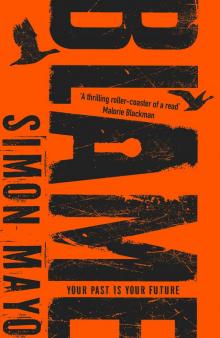 Blame
Blame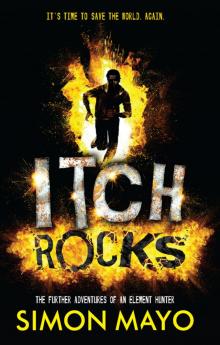 Itch Rocks
Itch Rocks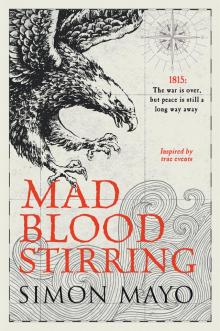 Mad Blood Stirring
Mad Blood Stirring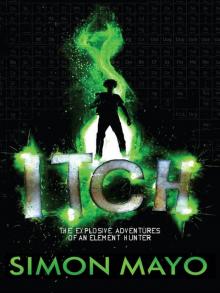 Itch
Itch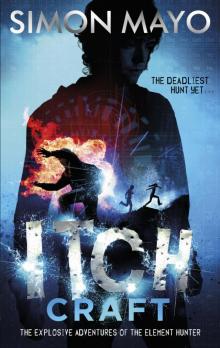 Itchcraft
Itchcraft